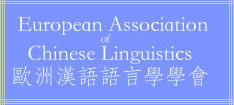2016: Amiens, France, 6 – 9 June
10th EACL Summer School in Chinese Linguistics
June 6 (Monday) -9 (Thursday), 2016
University of Picardy Jules Verne at Amiens, France
Co-sponsored by
University of Picardy Jules Verne (UPJV), France : Chinese Department of the Faculty of Foreign Languages and Cultures, International Affairs Directorate and Centre d’Etudes des Relations et Contacts Linguistiques et Littéraires (CERCLL EA4283).
Local organizing committee:
Georges BÊ DUC (CERCLL), Cécile MATHIEU (CERCLL), Hongyuan SUN (CERCLL)
Françoise BOTTÉRO (CRLAO, CNRS-EHESS-INALCO)
Challenging received views on the Chinese writing system
In this seminar, we shall look at the traditional approach of the Chinese writing system and point out some of the problems concerning its origins, the relation between the script and the language, the Liùshū 六書, etc. We shall question its definition from a linguistic point of view and consider what it can contribute to a general definition of writing.
Victor Junnan PAN (Université Paris Diderot, LLF)
Sentence-final particles in Mandarin Chinese: from syntax to discourse
This course will discuss the correlation between syntax and discourse by examining the system of sentences-final particles (SFPs) in modern Mandarin. The ordering between different types of SFPs is strict, reflecting their relative structural hierarchy. For instance, particles closely related to the speaker’s attitude or subjective opinion are always higher than those related to different sentential aspects; the combination between these two types of particles is possible. Such a hierarchy shows that discourse constraints influence syntax in a particular way. Precisely, I will show how a syntactic hierarchical order reflects the requirement from discourse.
No generative syntax background is required for attending this course.
Waltraud PAUL (CRLAO, CNRS-EHESS-INALCO)
Complex sentences in Mandarin Chinese and related issues
A careful analysis of Mandarin complex sentences shows that “subordinate” clause – but also “adjunct” clause – are foremost semantic labels which do not necessarily reflect the structural hierarchy; on the contrary, when preceding the main clause, the “adjunct clause” as clausal topic in fact occupies a position above the “main clause”. Labels such as “conjunctions” and “adverbial subordinator” are likewise semantically motivated, as witnessed by the categorial heterogeneity of the corresponding items in Chinese. This class does not correspond to a unique syntactic category in English, either (before, after are prepositions, that, if complementisers, and whether, when (wh-) phrases). Evidence is provided for the status of “conjunctions” in Chinese as either adverbs or prepositions; this analysis is tied up with general principles of Chinese syntax (among others the existence of both a sentence-external and sentence-internal topic position). Time permitting, the consequences are examined which the categorial heterogeneity of “conjunctions” in Chinese (and English) has for typological surveys such as WALS (Word Atlas of Languages: wals.info).
Carlotta SPARVOLI (University College Cork, School of Asian Studies)
Modality in Mandarin Chinese
Modality (情态 qíngtài) is generally understood in two different ways: a) in the illocutionary sense, it corresponds with the expression of the speaker’s attitude towards the propositional content; b) from a logico-semantic perspective, it is a linguistic category related to the notions of possibility and necessity (i.e., similarly to tense and aspect, it enables to express contents beyond the “here and now”). In the first sense, the Chinese prototypical expressions of modality are the modal particles. In the second sense, modality is lexicalized as an array of items (the so called “modals” qíngtàicí) including verbs, adverbs and adverbials. We will present the main taxonomies related to Chinese modality and the lexical items that are prototypical for each division. More specifically, we will concentrate on a set of 12 main modals (yīdìng, yīnggāi, gāi, dāng, yào, bìxū, děi, dé, huì, néng, kěyǐ, kěnéng) and analyse their distinctive features with respect to concepts such as scalarity, interdefinability and interaction with negation.
Hongyuan SUN (Université de Picardie Jules-Verne, CERCLL)
Tense and aspect in Mandarin Chinese
This course investigates temporal reference in Mandarin. We review the proposals put forth for Mandarin (a language with no overt tense morpheme), as well as other morphologically tenseless languages, seeking to clarify what the tensed vs. tenseless split covers, theoretically and empirically, from the combined perspective of morphology, syntax and semantics.
After an introduction of the theoretical background on tense and aspect underlying the relevant proposals, issues such as interactions between aspect and temporal reference in Mandarin will be addressed with a focus on the temporal construal of sentences (root clauses as well as embedded clauses) without overt aspectual marking.
Invited talk by Catherine DOUAY (Université de Picardie Jules-Verne, CORPUS)
Revisiting verb aspect in English: the case of the progressive
The progressive form of the English verb (e.g. it is raining), as opposed to the simple form (it rains) is commonly defined as expressing imperfective aspect: it provides an interior view of the event, which is more or less represented as incomplete or ongoing at the time of reference. Numerous counter-examples have led “enunciation theories” to highlight functions of aspect in terms of presupposition or anaphora. This analysis in turn proves inadequate. We will see that the progressive form substitutes for the simple when a contrastive dimension is involved in communication, and conversely the lack of any contrastive dimension characterizes the simple form. This observation sheds new light on the communicational nature of aspectual distinctions and what is really at stake for the description of linguistic systems.
Download: 2016 EACL Summer School Amiens [pdf]
